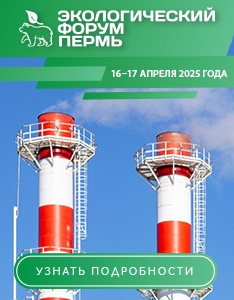| ОТРАСЛЕВОЙ РЕСУРС |

| ПЕРСОНАЛЬНАЯ СТРАНИЦА |
| ЧИТАЙТЕ В СЛЕДУЮЩЕМ НОМЕРЕ |
ПОДРОБНЕЕ

| НОВОСТИ |
Сегодня
В тарифах на ТКО планируют учитывать затраты на перегрузочные станции и техногрунты
Сегодня
Штраф в 40 тысяч за вред экологии
Вчера
Предлагается исключить некоторые документы из перечня обязательных требований
ВСЕ НОВОСТИ
В тарифах на ТКО планируют учитывать затраты на перегрузочные станции и техногрунты
Сегодня
Штраф в 40 тысяч за вред экологии
Вчера
Предлагается исключить некоторые документы из перечня обязательных требований
ВСЕ НОВОСТИ


| ФОРУМ |
НА ФОРУМЕ ОБСУЖДАЮТ:
Мусор в России начнут убирать с помощью искусственного интеллекта
Сообщений: 1
Последнее сообщение: 04.04.2025 08:24
РЭО назвал ключевые достижения в сфере обращения с отходами ко Дню без отходов
Сообщений: 5
Последнее сообщение: 04.04.2025 07:51
Немецкие ученые превращают пластиковые отходы в сырье для 3D-печати
Сообщений: 1
Последнее сообщение: 02.04.2025 11:14
Сообщений: 1
Последнее сообщение: 04.04.2025 08:24
РЭО назвал ключевые достижения в сфере обращения с отходами ко Дню без отходов
Сообщений: 5
Последнее сообщение: 04.04.2025 07:51
Немецкие ученые превращают пластиковые отходы в сырье для 3D-печати
Сообщений: 1
Последнее сообщение: 02.04.2025 11:14
ПОПУЛЯРНЫЕ ТЕМЫ:
Переработка отработанных шин
Просмотров: 6651368
Последнее сообщение: 20.02.2025 09:34
Термохимическая переработка ТБО
Просмотров: 1213350
Последнее сообщение: 05.03.2025 10:42
"Бумажный"ТБО"-спорим,коментируем, задаем вопросы авторам статей, доступных для скачивания
Просмотров: 440435
Последнее сообщение: 03.01.2025 13:46
ПЕРЕЙТИ НА ФОРУМ
Просмотров: 6651368
Последнее сообщение: 20.02.2025 09:34
Термохимическая переработка ТБО
Просмотров: 1213350
Последнее сообщение: 05.03.2025 10:42
"Бумажный"ТБО"-спорим,коментируем, задаем вопросы авторам статей, доступных для скачивания
Просмотров: 440435
Последнее сообщение: 03.01.2025 13:46
ПЕРЕЙТИ НА ФОРУМ

| КОНТАКТЫ |
Адрес редакции: 105066, Москва, Токмаков пер., д. 16, стр. 2, пом. 2, комн. 5
Редакция:
Телефон: +7 (499) 267-40-10
E-mail: red@solidwaste.ru
Отдел подписки:
Прямая линия:
+7 (499) 267-40-10
E-mail: podpiska@vedomost.ru
Отдел рекламы:
Прямая линия:
+7 (499) 267-40-10
+7 (499) 267-40-15
E-mail: reklama@vedomost.ru
Вопросы работы портала:
E-mail: support@solidwaste.ru
Редакция:
Телефон: +7 (499) 267-40-10
E-mail: red@solidwaste.ru
Отдел подписки:
Прямая линия:
+7 (499) 267-40-10
E-mail: podpiska@vedomost.ru
Отдел рекламы:
Прямая линия:
+7 (499) 267-40-10
+7 (499) 267-40-15
E-mail: reklama@vedomost.ru
Вопросы работы портала:
E-mail: support@solidwaste.ru
| ПОПУЛЯРНЫЕ ЗАПРОСЫ |
.gif)
| Главная страница / О журнале / Архив выпусков / Просмотр статей выпуска / Просмотр статьи |

Annotations of issues Municipal Solid Waste magazine (№ 6, June 2013)

| КАТАЛОГ ВТОРСЫРЬЯ |
| ЦЕНЫ НА ВТОРСЫРЬЕ |
- Лом и отходы драгметаллов
- Макулатура
- Органические отходы
- Отработанные аккумуляторы и элементы питания
- Отходы древесины
- Отходы нефтепродуктов
- Отходы пищевых производств
- Полимерные отходы, пластмассы
- Стеклобой, отходы стекла
- Строительные отходы
- Текстильные отходы и кожа
- Цветной металлолом
- Черный металлолом
- Шины и резиновые отходы
- Электронный лом

| КАТАЛОГ ПРЕДПРИЯТИЙ |
ЗАО Экорм
Поставляем и монтируем технологические линии, позволяющие переработать отходы с/х продукции (производств). В т.ч. отбраковку, некондицию, конфискаты, просроченное и т. д.
ООО "Электропром"
Утилизация оргтехники, покупка-продажа лома и отходов драгоценных металлов и электронного лома и отходов.
ООО "ПРИОР"
Сбор и утилизация промышленных отходов и ТКО
ВСЕ ПРЕДПРИЯТИЯ
Поставляем и монтируем технологические линии, позволяющие переработать отходы с/х продукции (производств). В т.ч. отбраковку, некондицию, конфискаты, просроченное и т. д.
ООО "Электропром"
Утилизация оргтехники, покупка-продажа лома и отходов драгоценных металлов и электронного лома и отходов.
ООО "ПРИОР"
Сбор и утилизация промышленных отходов и ТКО
ВСЕ ПРЕДПРИЯТИЯ

| ПОПУЛЯРНЫЕ ЗАПРОСЫ |
Уничтожение отходов
Вывоз бытовых отходов
Паспортизация отходов
Установка мультилифтов
Евроконтейнер для мусора
Вторичный гранулированный полипропилен
Утилизация окон
Утилизация волос
Лицензия на транспортировку опасных отходов
Переработка твердых отходов
Вывоз бытовых отходов
Паспортизация отходов
Установка мультилифтов
Евроконтейнер для мусора
Вторичный гранулированный полипропилен
Утилизация окон
Утилизация волос
Лицензия на транспортировку опасных отходов
Переработка твердых отходов
| СДЕЛАЙ САМ |
| МЕНЮ ПОРТАЛА "ТВЕРДЫЕ БЫТОВЫЕ ОТХОДЫ" |


